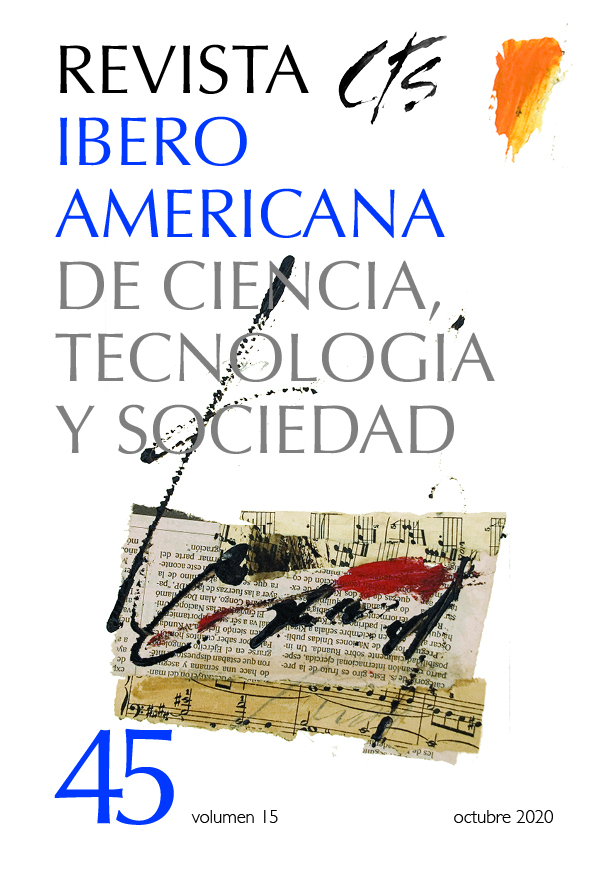From Evaluating Differently to Prioritizing as Usual. Bureaucratization and Institutional Inertias in the Implementation of Research Policy Aimed at Technological and Social Development
Keywords:
PDTS, assessment, direction of research, scientific policyAbstract
This paper aims at analysing the implementation of technological and social development projects (PDTS, due to its initials in Spanish), a research policy launched in Argentina in 2012. Based on interviews with involved parties and institutional documents, it maps how the Ministry of Science, Technology and Productive Innovation established a relationship between assessing and guiding research and the nuances adopted in the case of PDTS. Particularly, it focuses on the difficulties that arose in the implementation phase. After an initial launch with high expectations, the instrument showed limitations to change established dynamics within the scientific and university system, amongst them the unforeseen multiplication of assessment stages, the impossibility of moving forward with an agreed-upon inter-institutional document with assessment criteria and the bureaucratization of the role of external institutions. This paper also highlights the weakness of the incentives offered to researchers to commit to this initiative and the importance of taking into account the inertias in academic institutional cultures. In turn, it identifies a shift in the iniciative that went from the original intent of modifying the assessment guidelines to prioritizing the funding of matters of technological and social relevance.Downloads
References
AKSNES, D. W. y RIP, A. (2009): “Researchers’ perceptions of citations”, Research Policy, vol. 38, n° 6, pp. 895-905.
ALBORNOZ, M. y GORDON, A. (2010): “La política deficiencia y tecnología en Argentina desde la recuperación de la democracia (1983-2009)”, en M. Albornoz y J. Sebastián (eds.): Trayectorias de las políticas científicas y universitarias en Argentina y España, Madrid, CSIC, 67-122.
AROCENA, R. y SUTZ, J. (2007): “Universities, innovation and development processes in the changing global economy”, 2007 Atlanta Conference on Science, Technology and Innovation Policy, pp. 1-11.
BIANCO, M., GRAS, N. y SUTZ, J. (2014): “Reflexiones sobre la práctica de la evaluación académica” Veinte años de políticas de investigación en la Universidad de la República: aciertos, dudas y aprendizajes, pp. 209-235.
BUTLER, L. (2007): “Assessing University Research: A Plea for a Balanced Approach”, Science and Public Policy, vol. 34, n° 8, pp. 565–574.
EMILIOZZI, S. (2011): “Políticas en ciencia y tecnología, definición de áreas prioritarias y universidad en Argentina”, Revista Sociedad, vol. 29, n° 30, pp. 1-17.
ESTÉBANEZ, M. E. (2007): “Ciencia, tecnología y políticas sociales”, Ciencia, docencia y tecnología, vol. 18, n° 34.
ETZKOWITZ, H., y LEYDESDORFF, L. (2000): “The dynamics of innovation: from National Systems and ‘Mode 2’ to a Triple Helix of university–industry–government relations”, Research policy, vol. 29, n° 2, pp. 109-123.
FUNTOWICZ, S. O. y RAVETZ, J. R. (1993): “Science for the post-normal age”, Futures, vol. 25, n° 7, pp. 739-755.
GIBBONS, M. (1994): The new production of knowledge: The dynamics of science and research in contemporary societies, Nueva York, Sage.
IRVINE, J. y MARTIN, B. R. (1984): Foresight in science: Picking the winners, Londres, Pinter Pub Ltd.
KALTENBRUNNER, W. y de RIJCKE, S. (2017): “Quantifying ‘output’ for evaluation: administrative knowledge politics and changing epistemic cultures in Dutch law faculties”, Science and Public Policy, vol. 44, n° 2, pp. 284-293.
LUNDVALL, B. A. (1992): National systems of innovation: An analytical framework, Londres, Pinter.
LLOMOVATTE, S., NAIDORF, J. y PEREYRA, K. (2009): La universidad cotidiana. Modelos y experiencias de transferencia social, Buenos Aires, Eudeba.
NAIDORF, J. (2005): Los cambios en la cultura académica a partir de los procesos de vinculación universidad-empresa en las universidades públicas, tesis doctoral. Disponible en: http://repositorio.filo.uba.ar/handle/filodigital/1370.
NAIDORF, J., VASEN, F. y ALONSO, M. (2016): “Evaluación académica y relevancia socioproductiva: los Proyectos de Desarrollo Tecnológico y Social (PDTS) como política científica”, Cadernos PROLAM/USP, vol. 14, n° 27, pp. 43-63.
RIN/NESTA (2010): “Open to all? Case studies of openness in research”. Disponible en: www.rin.ac.uk/system/files/attachments/NESTA-RIN_Open_Science_V01_0.pdf. Consultado el 10 de abril de 2018.
RIJCKE, S. D. et al. (2016): “Evaluation practices and effects of indicator use—a literature review”, Research Evaluation, vol. 25, n° 2, pp. 161-169.
SANZ-MENÉNDEZ, L. (2014): “La evaluación de la ciencia y la investigación”, Revista Española de Sociología, vol. 21.
SLAUGHTER, S. y LESLIE, L. L. (1997): Academic capitalism: Politics, policies, and the entrepreneurial university, Baltimore, The Johns Hopkins University Press.
VACCAREZZA, L. S. (2004): “El campo CTS en América Latina y el uso social de su producción”, Revista Iberoamericana de Ciencia, Tecnología y Sociedad —CTS, vol. 1, n° 2.
VAN LEEUWEN, T. N. y SCHNEIDER, J. W. (2014): “Analyzing robustness and uncertainty levels of bibliometric performance statistics supporting science policy. A case study evaluating Danish post-doc funding”, Research Evaluation, vol. 23, n° 4, pp. 285-297.
VAN NOORDEN, R. (2010): “Metrics: A profusion of measures”, Nature News, vol. 465, n° 7300, pp. 864-866.
VASEN, F. (2013): “Las políticas científicas de las universidades nacionales argentinas en el sistema científico nacional”, Ciencia, docencia y Tecnología, vol. 24, n° 46, pp. 9-32.
VASEN, F. (2018): “La ‘torre de marfil’ como apuesta segura. Políticas científicas y evaluación académica en México”, Archivos Analíticos de Política Educativa, vol. 26, n° 96, pp. 1-27.
ZIMAN, J. (2000): “Are debatable scientific questions debatable?”, Social Epistemology, vol. 14, n° 2-3, pp. 187-199.
Downloads
Published
How to Cite
Issue
Section
License
All CTS's issues and academic articles are under a CC-BY license.
Since 2007, CTS has provided open and free access to all its contents, including the complete archive of its quarterly edition and the different products presented in its electronic platform. This decision is based on the belief that offering free access to published materials helps to build a greater and better exchange of knowledge.
In turn, for the quarterly edition, CTS allows institutional and thematic repositories, as well as personal web pages, to self-archive articles in their post-print or editorial version, immediately after the publication of the final version of each issue and under the condition that a link to the original source will be incorporated into the self-archive.











